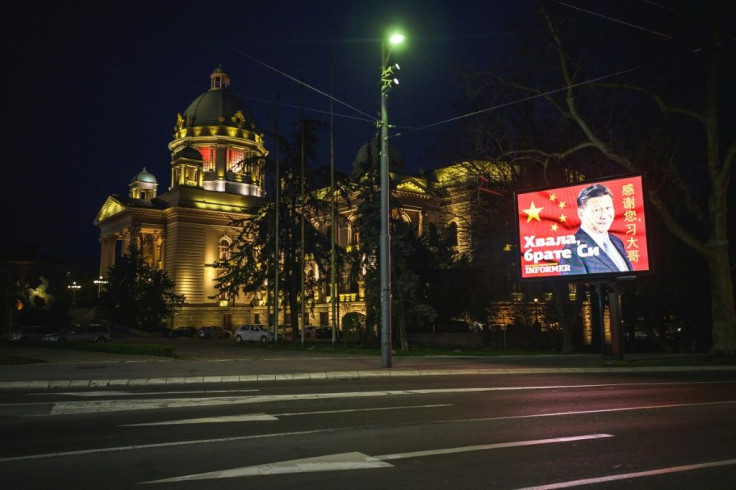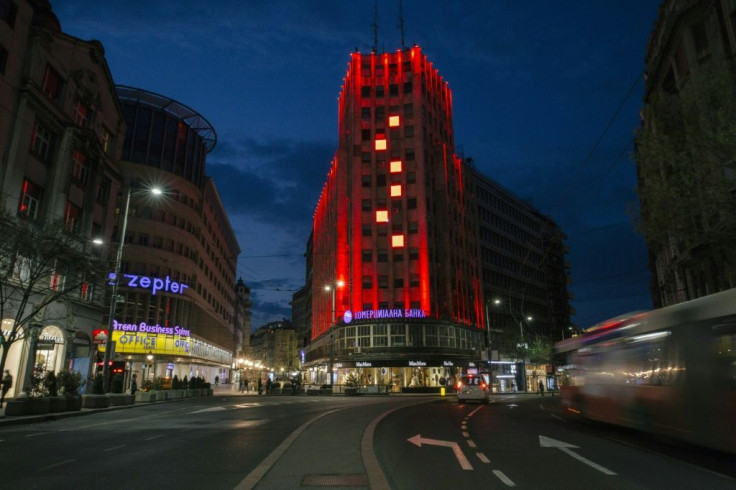Serbia Sets The Stage For Beijing's Mask Diplomacy

When six Chinese doctors landed in Belgrade two weeks ago, Serbia's president greeted them with elbow-bumps before laying a kiss on their country's flag, a gesture of gratitude that sent Chinese social media aflutter.
These doctors are now running the Balkan state's COVID-19 strategy, as Serbia becomes a willing theatre for Beijing's "mask diplomacy".
For weeks China has been showering European countries with millions of face masks, test kits and other aid, recasting itself as the hero in the battle against coronavirus.
EU officials have started to warn against a Beijing propaganda campaign -- spun through the "politics of generosity" -- that is distorting China's initial missteps in managing a contagion that started on its soil and has now killed more than 40,000 people across the globe.
But Serbia, an EU candidate country with a long history of balancing its Western and Eastern alliances, has never been so lavish in its praise.
"Chinese experts are the first to have defeated the virus. From now on, we will do everything they say," Serbia's President Aleksandar Vucic said as state TV broadcast the arrival of the plane carrying the doctors and equipment.
Since then, the Chinese team has helped redraw the country's approach to containing COVID-19, which has killed more than 20 Serbians and infected nearly 1,000.
Plans to use a military hospital as a hub for coronavirus patients were scrapped after the Chinese experts said the site's ventilation was unsuitable, officials told media.
The doctors were also behind the decision to ramp up testing -- with a goal of 7,000 daily in April -- and set up enormous field hospitals around the country to house patients with mild symptoms.
"It was agreed that from the moment of their arrival our experts will consult with Chinese experts on all future decisions," Prime Minister Ana Brnabic said.
In the centre of Belgrade, Chinese President Xi Jinping's face now peers out from a billboard with the words "Thank you brother Xi", a message paid for by a pro-government tabloid.
The adulation is playing out against a backdrop in which the government has framed the EU as absent and ineffective.
Serbia's president, accused of growing authoritarianism, initially downplayed the threat of the respiratory disease.
In a press conference he joked it could be treated with a few glasses of rakija -- the ultra-strong Balkan brandy.
When the dangers became undeniable, however, Vucic pivoted to blasting a lack of help from the EU, which has become a go-to punching bag for populists in the region.
"The best way to insulate himself from criticism for his previous mishandling of the crisis is to launch attacks on the EU and hold pompous ceremonies at the airport welcoming Chinese doctors and medical deliveries," said Majda Ruge, a senior policy fellow at the European Council on Foreign Relations.

"The imagery is very powerful".
The fanfare is welcomed by Beijing, eager to paper over its initially slow response in managing the outbreak.
Video of Vucic kissing China's flag was widely aired back home and won the Serbian president an army of Chinese online fans, according to the nationalistic Global Times.
Web users applauded "his sincerity, gratitude, as well as attractive looking and tall figure", the state-run paper added.
EU officials have since raced to highlight their already significant investments in Serbia's healthcare -- more than 450 million euros ($492 million) in aid and loans over the past 20 years.
They also unveiled a fresh 93.4 million euro donation package to battle COVID-19 directly.
The exact quantities of China's help, meanwhile, have not been made public.
The coronavirus cooperation comes after decade of growing ties between Beijing and Belgrade.
Serbia has become a key foothold for China in Europe, and a base for billion-dollar investments spanning the infrastructure, energy and security sectors.
While the EU is still a bigger trade partner and donor, the bloc also has demands on environmental standards, human rights and rule of law -- areas in which Serbia has come under scrutiny.
Serbia "wants to stay on the good side of the Chinese" because they are "providing a lot and not asking a lot of questions," said Stefan Vladisavljev, an analyst in Belgrade.
According to some opinion polls, the Serbians rate China more favourably than Western countries.
The positive image is burnished by China's purchases of bankrupt industrial plants -- which rescued thousands of jobs -- and its support for Serbia on the emotive issue of Kosovo.
Serbia's favourite sportsman Novak Djokovic also recently gave his seal of approval.
In a video conference announcing his own one million euro donation to help Serbia fight the virus, the tennis star had some kind words for the country's far-east friend.
"I thank China from the bottom of my heart, on behalf of myself and the entire nation".
© Copyright AFP 2024. All rights reserved.





















